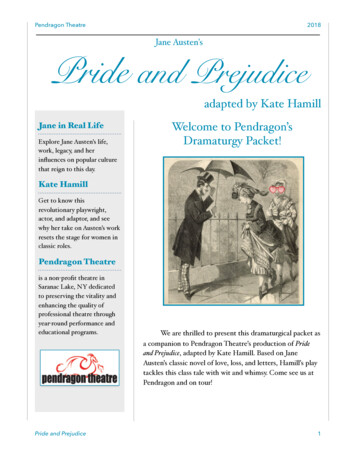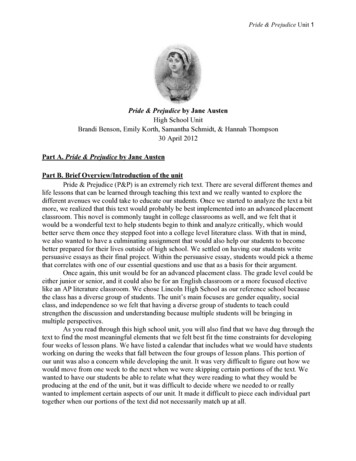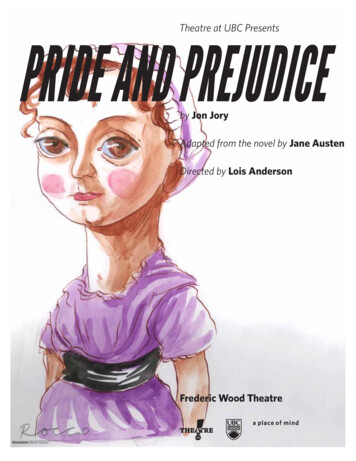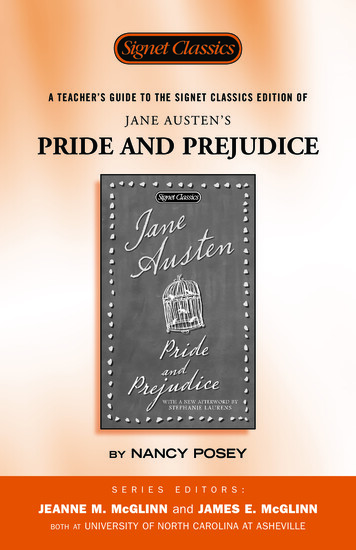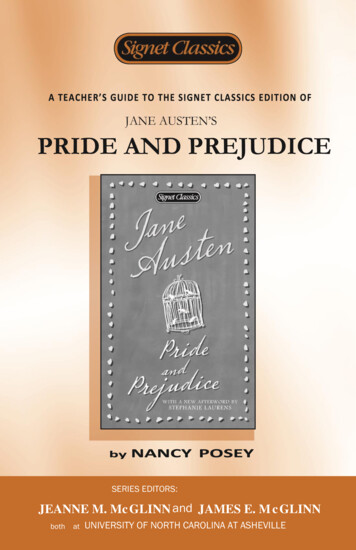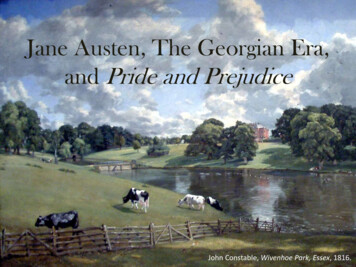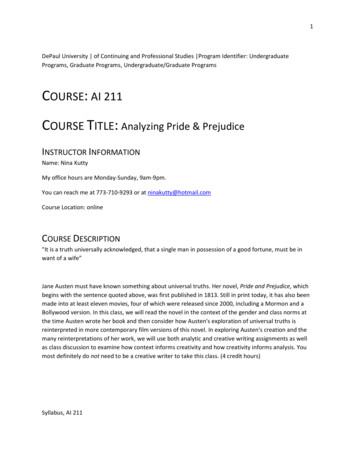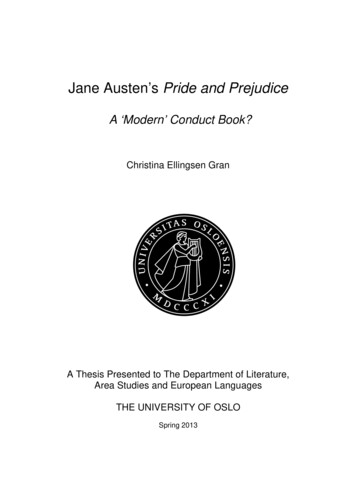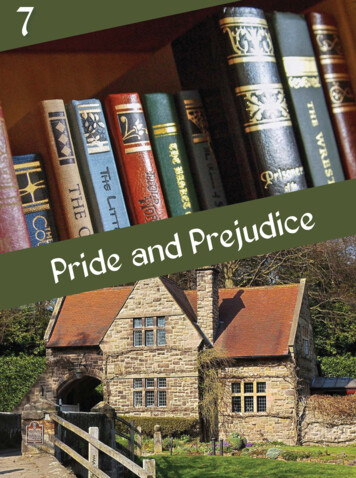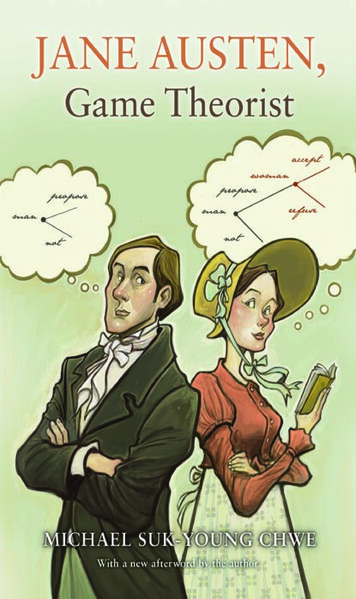
Transcription
Jane Austen, Game Theorist
Jane Austen, Game TheoristMichael Suk-Young ChwePRINCETON UNIVERSITY PRESSPRINCETONANDOXFORD
Copyright c 2013 by Princeton University PressPublished by Princeton University Press, 41 William Street,Princeton, New Jersey 08540In the United Kingdom: Princeton University Press, 6 Oxford Street, Woodstock, Oxfordshire OX20 1TWpress.princeton.eduAll Rights ReservedFourth printing, and first paperback printing, with a new afterword by the author, 2014paperback ISBN 978-0-691-16244-7The Library of Congress has cataloged the cloth edition of this book as followsChwe, Michael Suk-Young, 1965–Jane Austen, game theorist / Michael Suk-Young Chwe. pages cmIncludes bibliographical references and index.ISBN 978-0-691-15576-0 (hardcover : acid-free paper)1. Austen, Jane, 1775–1817—Criticism and interpretation.2. Austen, Jane, 1775–1817—Knowledge—Social life and customs.3. Game theory in literature. 4. Game theory—Social aspects. 5. Rational choicetheory—Social aspects. I. Title.PR4038.G36C49 20138230 .7—dc232012041510British Library Cataloging-in-Publication Data is availableThis book has been composed in SabonPrinted on acid-free paper Typeset by S R Nova Pvt Ltd, Bangalore, IndiaPrinted in the United States of America10 9 8 7 6 5 4
To my sister Lana
ContentsPrefaceAbbreviationsxixiiiCHAPTER ONEThe Argument1CHAPTER TWOGame Theory in Context9Rational Choice TheoryGame TheoryStrategic ThinkingHow Game Theory Is UsefulCriticismsGame Theory and Literature91215192530CHAPTER THREEFolktales and Civil Rights35CHAPTER FOURFlossie and the Fox43CHAPTER FIVEJane Austen’s Six Novels49Pride and PrejudiceSense and SensibilityPersuasionNorthanger AbbeyMansfield ParkEmmaCHAPTER SIXAusten’s Foundations of Game TheoryChoicePreferencesRevealed PreferencesNames for Strategic ThinkingStrategic SophomoresEyes5054606775869797102105107111113
viiiCHAPTER SEVENAusten’s Competing ModelsEmotionsInstinctsHabitsRulesSocial FactorsIdeologyIntoxicationConstraintsCHAPTER EIGHTAusten on What Strategic Thinking Is NotStrategic Thinking Is Not SelfishStrategic Thinking Is Not MoralisticStrategic Thinking Is Not EconomisticStrategic Thinking Is Not About Winning Inconsequential GamesCHAPTER NINEAusten’s InnovationsPartners in Strategic ManipulationStrategizing About YourselfPreference 133133134135137141141153158167CHAPTER TENAusten on Strategic Thinking’s Disadvantages171CHAPTER ELEVENAusten’s Intentions179CHAPTER TWELVEAusten on Cluelessness188Lack of Natural AbilitySocial DistanceExcessive Self-ReferenceHigh-Status People Are Not Supposed to Enter the Minds ofLow-Status PeoplePresumption Sometimes WorksDecisive BlundersCHAPTER THIRTEENReal-World CluelessnessCluelessness Is Easier188198200202205205211211
ContentsDifficulty Embodying Low-Status OthersInvesting in Social StatusImproving Your Bargaining PositionEmpathy PreventionCalling People Animalsix213217219224225CHAPTER FOURTEENConcluding Remarks228Afterword to the Paperback Edition235References237Index253
PrefaceTHE IDEA for this book started when I found Flossie and the Fox(McKissack 1986) for my children at a garage sale. For years I usedthe story of Flossie as an example in my graduate game theory classesbut never found a place for it in my writing. The opportunity camewhen I was asked to prepare a paper for a conference on “RationalChoice Theory and the Humanities.” I found similar folktales and beganto notice “folk game theory” in movies I watched together with mychildren. Watching Jane Austen adaptations led to reading her novels.Thus this book arose out of experiences with my children Hanyu andHana. Now as they are almost grown I hope that they will still want toread books and watch movies with their father.The “Rational Choice Theory and the Humanities” conference washeld at Stanford University in April 2005, and I am indebted to theorganizer, David Palumbo-Liu, and conference participants. Some of thematerial in the paper I wrote for the conference (Chwe 2009) appearsagain here. I am also indebted to participants in presentations I gavein December 2005 at the National Taiwan University, in April 2010at the Juan March Institute and the UCLA Marschak Colloquium, inMay 2011 at Yale University, and in June 2011 at the University ofOxford and the Stockholm School of Economics. Discussions continueat janeaustengametheorist.com.Writing a book invariably exposes one to undeserved generosity. Morethan once, I have drafted what seems like a delightfully original phraseonly to discover it in an email received earlier from a friend. The term“folk game theory” has also been independently coined in lectures byVince Crawford and in a recent paper by Crawford, Costa-Gomes, andIriberri (2010). Properly acknowledging the contributions of my friendsand colleagues is almost impossible, but I will try. Specifically (in reversealphabetical order), Guenter Treitel, Laura Rosenthal, Dick Rosecrance,Anne Mellor, Avinash Dixit, Vince Crawford, Tyler Cowen, Steve Brams,and Pippa Abston read the entire first draft and offered very helpfulcomments. Peyton Young, Giulia Sissa, Ignacio Sanchez-Cuenca, ValeriaPizzini-Gambetta, Rohit Parikh, Russ Mardon, and Neal Beck gave megreat suggestions. The comments of anonymous referees improved thebook, especially its overall organization, a lot. I am indebted. ChuckMyers and Peter Dougherty at Princeton University Press have alwaysbeen great. Linda Truilo’s care as copyeditor is very much appreciated.
xiiPrefaceI wrote this book while my wife and I were both teaching at UCLA,where we landed after moving three times in search of two jobs at thesame place. We are grateful to this university for its research environmentand also simply for making our family life possible. I will always lookback on this period of my life, with our children growing up amongmany loving families in Santa Monica, with the greatest affection.Finally, I would like to thank my own family: my wife and my children,my parents, and my brothers and my sister. If I could, I would dedicateeverything I do to them, not just books.Thank you for reading, even if these words appear on some sortof device with an off switch. Real books could come into your lifeserendipitously, from garage sales for example. We read them. We wrotethem. We loved them.
AbbreviationsThe following abbreviations are used for Jane Austen’s novels.EMPNAPPPSSEmmaMansfield ParkNorthanger AbbeyPersuasionPride and PrejudiceSense and Sensibility
Jane Austen, Game Theorist
CHAPTER ONEThe ArgumentNOTHING IS MORE human than being curious about other humans.Why do people do what they do? The social sciences have answered thisquestion in increasingly theoretical and specialized ways. One of the mostpopular and influential in the past fifty years, at least in economics andpolitical science, has been game theory. However, in this book I arguethat Jane Austen systematically explored the core ideas of game theoryin her six novels, roughly two hundred years ago.Austen is not just singularly insightful but relentlessly theoretical.Austen starts with the basic concepts of choice (a person does what shedoes because she chooses to) and preferences (a person chooses accordingto her preferences). Strategic thinking, what Austen calls “penetration,”is game theory’s central concept: when choosing an action, a personthinks about how others will act. Austen analyzes these foundationalconcepts in examples too numerous and systematic to be consideredincidental. Austen then considers how strategic thinking relates to otherexplanations of human action, such as those involving emotions, habits,rules, social factors, and ideology. Austen also carefully distinguishesstrategic thinking from other concepts often confused with it, such asselfishness and economism, and even discusses the disadvantages ofstrategic thinking. Finally, Austen explores new applications, arguing,for example, that strategizing together in a partnership is the surestfoundation for intimate relationships.Given the breadth and ambition of her discussion, I argue thatexploring strategic thinking, theoretically and not just for practicaladvantage, is Austen’s explicit intention. Austen is a theoretician ofstrategic thinking, in her own words, an “imaginist.” Austen’s novelsdo not simply provide “case material” for the game theorist to analyze,but are themselves an ambitious theoretical project, with insights not yetsuperseded by modern social science.In her ambition, Austen is singular but not alone. For example, AfricanAmerican folktales celebrate the clever manipulation of others, andI argue that their strategic legacy informed the tactics of the U.S.civil rights movement. Just as folk medicine healed people long beforeacademic medicine, “folk game theory” expertly analyzed strategicsituations long before game theory became an academic specialty. Forexample, the tale of Flossie and the Fox shows how pretending to be
2Chapter 1naive can deter attackers, a theory of deterrence at least as sophisticatedas those in social science today. Folk game theory contains wisdom thatcan be explored by social science just as traditional folk remedies areinvestigated by modern medicine. Game theory should thus embraceAusten, African American folktellers, and the world’s many folk gametheory traditions as true scientific predecessors.The connection between Austen’s novels, among the most widelybeloved in the English language, and game theory, which can be quitemathematical, might seem unlikely. Austen’s novels are discerning andsensitive, whereas game theory is often seen as reductive and technical,originating out of a Cold War military-industrial “think tank.” But sinceboth Austen and game theory build a theory of human behavior basedupon strategic thinking, it is not surprising that they develop the sameconcepts even as they consider different applications. Strategic thinkingcan reach a surprising level of virtuosity, but people actually do it all thetime (for example, I hide the cookies because I know that otherwise youwill eat them all). A theory based on strategic thinking is, of course, notthe only theory of human behavior or always the most relevant, but it isuseful and “universal” enough to have developed independently, in quitedifferent historical contexts.Why should we care about Austen’s place in the history of gametheory? The most obvious trend in the language of the social sciencesover the past fifty years is a greater use of mathematics. A large part ofthis trend is the growth of game theory and its intellectual predecessor,rational choice theory. This growth is indeed one of the broadestdevelopments in the social sciences in the past fifty years, significantenough to have broader social as well as scholarly implications; forexample, some claim that the 2008 global financial crisis was caused inpart by rationality assumptions in economics and finance (for exampleStiglitz 2010; see also MacKenzie 2006).Recognizing Austen as a game theorist helps us see how game theoryhas more diverse and subversive historical roots. Austen and AfricanAmerican folktellers speak as outsiders: women dependent on men,and slaves struggling for autonomy. They build a theory of strategicthinking not to better chase a Soviet submarine but to survive. Thepowerful can of course use game theory, but game theory developsdistinctively among the subordinate and oppressed, people for whommaking exactly the right strategic move in the right situation can haveenormous consequences: women who might gain husbands, and slaveswho might gain freedom. The dominant have less need for game theorybecause from their point of view, everyone else is already doing what theyare supposed to. Game theory is not necessarily a hegemonic Cold Wardiscourse but one of the original “weapons of the weak” (as in Scott
The Argument31985). By recovering a “people’s history of game theory” (as in Zinn2003) we enlarge its potential future.Understanding Austen’s six novels as a systematic research project alsoallows us to interpret many details not often examined. For example,why do Austen’s Jane Fairfax and Mr. John Knightley discuss whetherthe reliability of postal service workers is due to interest or habit? WhenEmma Woodhouse paints a portrait of Harriet Smith and Mr. Eltonadores it, why does Emma think that Mr. Elton is in love with thepainting’s subject, not its creator? Why is Fanny Price grateful not to haveto choose between wearing Edmund Bertram’s chain or Mary Crawford’snecklace, but then decides to wear both? When they meet for the firsttime, why does Mrs. Croft ask Anne Elliot whether she has heard thatMrs. Croft’s brother has married, without specifying which brother?There is, of course, an immense literature on Austen, and I cannot claimthe primacy of my own reading. Still, a strategic sensibility can helpgenerate and answer questions like these.Recognizing Austen as a game theorist is worthwhile not only forthe sake of intellectual genealogy. Anyone interested in human behaviorshould read Austen because her research program has results.Austen makes particular advances in a topic not yet taken up bymodern game theory: the conspicuous absence of strategic thinking, whatI call “cluelessness.” Even though strategic thinking is a basic humanskill, often people do not apply it and even actively resist it. For example,when Emma says that “it is always incomprehensible to a man that awoman should ever refuse an offer of marriage. A man always imaginesa woman to be ready for anybody who asks her” (E, p. 64), she arguesthat men as a sex are clueless: they do not consider women as having theirown preferences and making their own choices. Clueless people tend toobsess over status distinctions: in the African American tale “Malitis,”a slaveowner, heavily invested in the caste difference between him andhis slaves, has difficulty understanding his slaves as strategic actors andis thereby easily tricked. Cluelessness, the absence of strategic thinking,has particular characteristics and is not just generic foolishness.Austen explores several explanations for cluelessness. For example,Austen’s clueless people focus on numbers, visual detail, decontextualized literal meaning, and social status. These traits are commonlyshared by people on the autistic spectrum; thus Austen suggests anexplanation for cluelessness based on individual personality traits. Another of Austen’s explanations for cluelessness is that not having to takeanother person’s perspective is a mark of social superiority over thatperson. Thus a superior remains clueless about an inferior to sustainthe status difference, even though this prevents him from realizing howthe inferior is manipulating him. Austen’s explanations for cluelessness
4Chapter 1apply to real-world situations, such as U.S. military actions in Vietnamand Iraq.In this book, no previous familiarity with game theory is presumed.In the next chapter, I explain game theory from the ground up; gametheory can be applied to complicated situations, but its basic ideasare not much more than common sense. I start with the concepts ofchoice and preferences. I discuss strategic thinking as a combination ofseveral skills, including placing yourself in the mind of others, inferringothers’ motivations, and devising creative manipulations. To illustrategame theory’s usefulness, I use a simple game-theoretic model to showhow Beatrice and Benedick in Shakespeare’s Much Ado About Nothing,Richard and Harrison in Richard Wright’s Black Boy, and peoplerevolting against an oppressive regime all face the same situation. Gametheory has been criticized as capitalist ideology in its purest form—acontextual, technocratic, and a justification for selfishness. But Austenmakes us rethink these criticisms, for example, in her argument that awoman should be able to choose for herself regardless of whether othersconsider her selfish. I conclude the chapter by looking at previous worktrying to bring game theory, as well as related concepts such as “theoryof mind,” together with the study of literature.Before immersing into Austen, in chapter 3 I discuss the strategicwisdom of African American folktales, such as the well-known “TarBaby” tale. The tale of Flossie and the Fox, in which the little girl Flossiedeters Fox’s attack by telling Fox that she does not know that he is a fox,is an elegant analysis of power and resistance, which I also representmathematically in chapter 4. These folktales teach how inferiors canexploit the cluelessness of status-obsessed superiors, a strategy that cancome in handy. In their 1963 Birmingham, Alabama, campaign, civilrights strategists counted on the notoriously racist Commissioner ofPublic Safety “Bull” Connor to react in a newsworthy way, and sureenough, he brought out attack dogs and fire hoses.In this book, no previous familiarity with Austen is presumed.I provide a summary of each novel in chapter 5, arguing that each isa chronicle of how a heroine learns to think strategically: for example,in Northanger Abbey, Catherine Morland must learn to make her ownindependent choices in a sequence of increasingly important situations,and in Emma, Emma Woodhouse learns that pride in one’s strategicskills can be just another form of cluelessness. Austen theorizes howpeople, growing from childhood into adult independence, learn strategicthinking.Next I trace the detailed connections between Austen’s novels andgame theory, taking the six novels together. This is the analytic coreof the book, chapters 6 to 12. Austen prizes individual choice and
The Argument5condemns any attempt to deny or encumber a person’s ability to choose.There is “power” in being able to choose. Austen consistently delightsin how completely different feelings, such as the pain of a brokenheart and the pleasure of a warm fire, can compensate for each other.This commensurability, that feelings can be reduced into a single “net”feeling, is the essential assumption behind game theory’s representationof preferences as numerical “payoffs,” and indeed Austen sometimesjokes that feelings can be represented numerically. A person’s preferencesare best revealed by her choices, as in economic theory’s “revealedpreference”; for example, Elizabeth Bennet estimates the strength ofMr. Darcy’s love by the many disadvantages it has to overcome.Austen’s names for strategic thinking include “penetration” and “foresight,” and the six novels contain more than fifty strategic manipulationsspecifically called “schemes.” For Austen, “calculation” is not the leastbit technocratic or mechanistic. Austen makes fun of the strategicallysophomoric; characters like Mrs. Jennings, whose manipulations arehopelessly misconceived, best illustrate (the absence of) strategic skill.The strategically skilled carefully observe others’ eyes, not just because“penetration” and “foresight” are visual analogies, but because a person’s eyes reveal his preferences.Austen’s commitment to game-theoretic explanation is delightfullyundogmatic. She generously allows for the importance of alternativeexplanations, such as those based on emotion, instinct, and habit,but consistently favors explanations based on choice, preferences, andstrategy. Austen’s heroines make good choices even when overpoweredby emotion. Even blushing, which seems to be a completely emotionalresponse, is regarded at least partly a matter of choice. Austen acknowledges the influence of instincts and habits, but dislikes them: instinctiveactions turn out badly, and habits, such as Fanny Price’s submissivenessor Willoughby’s idleness, are usually painful or ruinous. Twice Austenexplicitly compares an explanation based on people’s habits with anexplanation based on their preferences and concludes that preferencesare more important. Austen allows that people often follow rules orprinciples instead of choosing consciously, but observes that adoptinga rule is itself a matter of choice.Austen acknowledges the importance of social factors such as envy,duty, pride, and honor but in general condemns them; Austen’s heroinessucceed not because of social factors but in spite of them. For example,when Fanny Price receives Henry Crawford’s proposal, her familymembers invoke social distinction, conformity, duty, and gratitude topressure her to accept, but Fanny heroically makes her own decisionbased on what she herself wants. Even if social factors affect you,Austen maintains that they should affect only your behavior and not
6Chapter 1your thought processes, which must remain independent. Even under themost severe social constraints, a person can strategically maneuver; infact, constraints make you learn strategic thinking more quickly.Austen also takes care to distinguish strategic thinking from conceptspossibly confused with it. Strategic thinking is not the same as selfishness:Fanny Dashwood is both selfish and a strategic blunderer, for example.Strategic thinking is not the same as moralizing about what one “should”do: Mary Bennet quotes maxims of proper conduct but is useless strategically. Strategic thinking is not the same as having economistic values suchas frugality and thrift: Mrs. Norris exemplifies both economizing andstrategic stupidity. Strategic thinking is not the same thing as being goodat artificially constructed games such as card games: Henry Crawfordlikes to win card games but in real life cannot choose between FannyPrice and the married Maria Rushworth and fails disastrously.In terms of results, Austen generates multiple insights not yet approached by modern game theory. In addition to analyzing cluelessness,she makes advances in four areas. First, Austen argues that strategicpartnership, two people joining together to strategically manipulate athird person, is the surest foundation for friendship and marriage. Eachof her couples comes together by jointly manipulating or monitoring athird person, for example a parent about to embarrass herself. Explainingto your partner your motivations and choices, strategizing in retrospect,is for Austen the height of intimacy. Second, Austen considers anindividual as being composed of multiple selves, which negotiate witheach other in a great variety of ways, not necessarily in a “chain ofcommand.” Just as a person anticipates other people’s actions, a personcan anticipate her own actions and biases; a person’s self-managementstrategy depends on her goals. Third, Austen considers how preferenceschange, for example through gratitude or when an action takes on anew social connotation (for example, when rejected by a suitor, you areeager to marry another to “take revenge”). Fourth, Austen argues thatconstancy, maintaining one’s love for another, is not passive waiting butis rather an active, strategic process which requires understanding theother’s mind and motivations.Austen even comprehensively considers the disadvantages of strategicthinking. Strategic thinking takes mental effort, gives you a morecomplicated moral life, allows you to better create excuses for others’misdeeds, and enlarges the scope of regret. People do not confide in youbecause they think you have already figured everything out; strategic skillis not charming or a sign of sincerity. Contemplating the machinationsof others can be painful, and sometimes it is better to plunge aheadand not worry about how people will respond. Finally, being good atstrategic thinking risks solipsism: you see strategicness where none exists,
The Argument7and pride in your own ability makes you think that others are perfectlyknowable.My claim is that Austen consciously intended to theorize strategicthinking in her novels; the occupation with strategic thinking is Austen’sand not just mine. I do not present direct evidence for this claim (such asa letter from Austen laying bare her objectives) but a preponderance ofindirect evidence. The connections between Austen’s writings and gametheory are just too numerous and close. Almost always when a childappears in her novels, for example, the child is either a student of strategicthinking (a three-year-old who learns to continue crying because shegets attention and sweets) or a pawn in someone else’s strategic action(Emma carries her eight-month-old niece in her arms to charm away anyresidual ill-feeling after an argument with Mr. Knightley). After HenryCrawford’s proposal to Fanny Price, Austen includes no fewer than sevenexamples of “reference dependence,” in which the desirability of anoutcome depends on the status quo to which it is compared. It is difficultto explain this repetition as a coincidence or unconscious tendency, andthe remaining conclusion is that Austen explicitly intended to explore thephenomenon.Perhaps Austen’s most extensive contribution to game theory is heranalysis of cluelessness. Austen gives five explanations for cluelessness,the conspicuous absence of strategic thinking. First, Austen suggeststhat cluelessness can result from a lack of natural ability: her cluelesspeople have several personality traits (a fixation with numeracy, visualdetail, literality, and social status) often associated with autistic spectrumdisorders. Second, if you don’t know much about another person, itis difficult to put yourself into his mind; thus cluelessness can resultfrom social distance, for example between man and woman, marriedand unmarried, or young and old. Third, cluelessness can result fromexcessive self-reference, for example thinking that if you do not likesomething, no one else does either. Fourth, cluelessness can result fromstatus differences: superiors are not supposed to enter into the minds ofinferiors, and this is in fact a mark or privilege of higher status. Fifth,sometimes presuming to know another’s mind actually works: if you canmake another person desire you, for example, then his prior motivationstruly don’t matter. Finally, I apply these explanations to the decisiveblunders of superiors in Austen’s novels.I then consider cluelessness in real-world examples and discuss fivemore explanations, which build upon Austen’s. First, cluelessness cansimply result from mental laziness. Second, entering another’s mind caninvolve imagining oneself in that person’s body, walking in his shoes, andseeing through his eyes; because of racial or status differences, a personwho regards himself superior finds this physical embodiment repulsive.
8Chapter 1Third, because social status simplifies and literalizes complicated socialsituations, people who are not good at strategic thinking invest morein status and prefer social environments, such as hierarchies, whichdefine interactions in terms of status. Fourth, in certain situationscluelessness can improve your bargaining position; by not thinking aboutwhat another person will do, you can commit yourself to not reacting.Fifth, even though strategic thinking is not the same thing as empathy(understanding another’s goals is not the same thing as sympathizingwith them), one might lead to the other; a slaveowner for example mightbe easily tricked by his slaves, but if he took their point of view wellenough to think about them strategically, he might not believe in slaveryanymore. Finally, I apply these explanations to the disastrous U.S. attackon Fallujah in April 2004.Why do people do what they do? This question is too interesting to beconfined to either novels or mathematical models, the humanities or thesocial sciences, the past or the present. I hope this book shows that it isnot at all surprising that Austen, a person intensely interested in humanbehavior, would help create game theory.
CHAPTER TWOGame Theory in ContextGAME THEORY considers interactions among two or more people andis built upon rational choice theory, which looks at the choice of asingle individual. I use a simple example from Austen’s Mansfield Park toillustrate first rational choice theory and then game theory. Since strategicthinking is the central concept of game theory, I discuss it in somedetail. I then use examples from William Shakespeare’s Much Ado AboutNothing and Richard Wright’s Black Boy to illustrate how game theorycan be useful, for example, in understanding popular revolt against aregime.The growth of game theory and rational choice theory in the socialsciences has met with substantial criticism. I next discuss how recognizingAusten as a game theorist puts these criticisms in a different light.For example, some critics argue that rational choice theory glorifiesselfishness and asociality, which must be held in check by social norms.But for Austen, insisting upon the right to choose according to one’sown preferences (over whom to marry, for example) is not selfish butsubversive. Austen’s heroines are already ensnared in social obligationsand expectations; more social norms are exactly what they do notneed.Game theory and literature have had previous interactions; for example, a few game theorists have analyzed literary works. Again, mystronger claim is that Austen herself is a game theorist, who in her novels explores decision-making and strategic thinking systematically andtheoretically. Finally, I consider how humanists have used ideas aboutrationality and cognition to analyze literature, and how understandingAusten as a game theorist relates to these discussions.RATIONAL CHOICE THEORYIn Austen’s Mansfield Park, five-year-old Betsey and her fourteen-yearold sister Susan are fighting because Betsey has taken possession ofSusan’s knife, a present from their departed sister Mary. Their older sisterFanny decides to buy a new knife for Betsey so that she will voluntarilygive up Susan’s knife. Betsey takes the new knife and household peace isrestored.
10Chapter 2Consider the situation before Fanny intervenes. Betsey chooses eitherto keep Susan’s knife or give it up. Rational choice theory represents thiswith the following diagram:Figu
exploring strategic thinking, theoretically and not just for practical advantage, is Austen's explicit intention. Austen is a theoretician of strategic thinking, in her own words, an "imaginist." Austen's novels do not simply provide "case material" for the game theorist to analyze,

